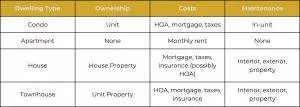Exploring the world of condominiums means exploring the complexities of living in a community and the attractiveness of urban areas that are easy to walk around. Condos are attractive choices for first-time homebuyers who want the benefits of owning a home without the heavy maintenance responsibilities. This guide aims to clarify the many aspects of condominium living, including the advantages and disadvantages, and the various types of condos available in the market. Furthermore, we will examine the important differences between a condo, an apartment, a townhome, and a single-family home.

Understanding Condominiums: A Comprehensive Overview
A condo, short for condominium, is a residential complex where each unit is owned by an individual condo owner. Renting a condo involves dealing directly with the owner, who is responsible for maintaining and repairing the unit. Condo owners are also required to contribute regular fees to a homeowners association (HOA), which helps maintain common areas, building amenities, and the overall appearance of the complex. Considering the pros and cons of condo ownership is crucial when deciding to invest in one, as it depends on individual financial circumstances.
Pros of Purchasing a Condo:
There are numerous reasons why choosing a condo can be a more appealing option compared to renting or owning a single-family home. Condos offer the benefits of property ownership along with additional amenities, reduced upkeep responsibilities, and enhanced affordability. They provide a unique homeownership experience that appeals to a wide range of individuals.
The purpose of this guide is to provide a comprehensive exploration of condos. It aims to equip prospective homebuyers with the necessary knowledge to make informed decisions about this distinctive housing option.
Advantages of Condo Ownership: A Detailed Examination
Choosing a condominium offers numerous advantages that go beyond just owning a property. Condominiums are a preferred option for many individuals due to their distinctive features. In this article, we will thoroughly examine the benefits associated with purchasing a condo.
Building Equity: Purchasing a condo offers a significant financial advantage – the chance to begin building equity. Unlike monthly rent payments which do not provide any long-term benefits, contributing to a mortgage helps to increase your ownership of the property. This not only gives you more options in the future but also allows you to benefit from any potential increase in the condo’s resale value.
Added Amenities: Living in a condominium often offers the benefit of having access to amenities like swimming pools, dog parks, or parking garages, which vary depending on the complex. The maintenance of these shared facilities is usually taken care of by a Homeowners Association (HOA), which means that condo owners don’t have to worry about the upkeep and can fully enjoy these amenities without any hassle.
Sense of Security: Condos often prioritize the safety and security of residents through the implementation of features such as gated entrances or the employment of security guards. Additionally, the proximity of neighbors and the strong sense of community within condos contribute to a heightened sense of security, making them an attractive choice for individuals who highly value safety.
Less Maintenance: Condos are ideal for individuals who want to own a home but don’t want the responsibilities that come with maintaining a single-family home. If you don’t enjoy tasks like mowing the lawn, shoveling snow, or fixing a roof, then a condo could be a great option for you. With reduced maintenance responsibilities, condo living offers a hassle-free homeownership experience that many find appealing.
Affordability: Condos are often a more affordable option compared to traditional homes, making them an appealing choice for first-time homebuyers with limited incomes. Even after taking into account condo association fees, the overall cost of owning a condo can be much more budget-friendly than owning a standalone house, enabling individuals with affordability concerns to achieve homeownership.
Investment Property Potential: Condos are highly favored by real estate investors due to their numerous advantages. These include their affordability, as well as their low maintenance needs and attractive amenities for renters. As a result, condos are considered to be profitable investment properties.
However, when it comes to making important choices like condo ownership, potential buyers must take into account certain factors and drawbacks. In this article, we will provide a detailed analysis of the downsides:
Disadvantages of Condo Ownership:
HOA Restrictions and Fees: When considering investing in a condominium complex, it is essential to take into account the regulations established by the Homeowners Association (HOA). These regulations may include restrictions on renting out units and owning pets. Additionally, monthly HOA fees are required to cover the maintenance of common areas and the upkeep of the building. The specific amount of fees varies depending on the location and size of the condo.
Limited Square Footage: Condo units often do not have private outdoor space available, which can be difficult for larger families or individuals who enjoy having a spacious outdoor area. To access parks or playgrounds, it may be necessary to travel a significant distance.
Privacy Concerns: Living in a condominium allows for a strong sense of community, as residents share common areas and walls. However, this shared living arrangement can sometimes compromise privacy. Noise issues can arise from the shared spaces, potentially disrupting the peacefulness of individual units.
Resale Challenges: The process of reselling condos can be complex, as it can be influenced by factors that are not within the owner’s control. These factors include the financial stability of the condo association and the level of strictness in its HOA covenants.
Limited Personalization: Condo owners may face limitations on exterior modifications or restrictions on displaying flags or decorations, depending on the regulations set by their HOA. These regulations can restrict the extent to which personalization is allowed.
When considering the purchase of a condominium, it is crucial to thoroughly assess its type, location, size of the complex, and the demographic of its tenants. This comprehensive evaluation provides potential buyers with the necessary information to make well-informed decisions about the distinct realm of owning a condo.
Exploring the Distinctions: Condos Compared to Other Residential Options
To better understand the distinct characteristics of condos in the realm of homeownership, it is important to conduct a thorough examination. Although often confused with apartments and townhouses, condos have their unique attributes. To provide a clearer understanding, we have prepared a comprehensive comparison of condos with other types of properties. This comparison will shed light on ownership structures, associated costs, and maintenance responsibilities.
Dwelling Types and Ownership Structures:

Condo vs. Apartment:
Differentiating between condominiums and apartments entails taking into account factors such as ownership, operational governance, and related expenses.
Ownership: Apartments are commonly owned by property management companies, whereas condos are comprised of individually owned units. Instead of being accountable to a property manager, condo residents establish a condo association to manage the expenses associated with maintaining communal areas within the condominium complex.
Costs: Condominium owners face various expenses such as mortgage payments, HOA fees, and property taxes and insurance. Renters may not notice a substantial difference in rental prices between apartments and condos, but there can be variations in the breakdown of payments, including potential obligations for association fees and utilities.
Maintenance: Condo owners have the responsibility of maintaining and repairing their units, regardless of whether they live there or rent them out. Unlike apartments, condos usually do not have a maintenance staff, so owners need to take care of these tasks themselves.
Condo vs. House:
When comparing condos to single-family homes, it is important to consider factors such as ownership, costs, and maintenance.
Ownership: Houses are independent buildings without shared walls, allowing homeowners to have ownership over both the property and the land it sits on. This includes having front and back yards, as well as a garage.
Costs: Detached single-family homes typically have a higher price compared to condos because they offer more square footage. When you own a home, you not only own the property and land but also have to take into account responsibilities like yard maintenance and property taxes.
Maintenance: Taking care of a home involves more tasks compared to maintaining a condominium. This includes being responsible for the house itself as well as the surrounding lot. Although making renovations to a home can increase its value, it is important to carefully consider the initial investment of both time and money.
Condo vs. Townhouse:
Townhomes serve as a bridge between condos and single-family homes, and it is important to explore their ownership structures, costs, and maintenance obligations.
Ownership: There are two types of ownership for townhomes: condominium ownership and fee-simple ownership. In the case of condo townhomes, owners have similar responsibilities to condo unit owners, where HOA fees are used to cover exterior maintenance and common areas. On the other hand, fee-simple townhome ownership entails responsibility for both the property and the land.
Costs: Townhouses, which have bigger lots in comparison to condominiums, tend to be pricier. It is important to take into consideration the higher Homeowners Association (HOA) fees for townhomes and balance them against the expenses associated with maintaining the house and property.
Maintenance: Condo owners are accountable for maintaining the interior of their units, while townhome owners have the responsibility of maintaining the interior, roof, exterior, and property, thereby resulting in higher HOA expenses on average.
Gaining a comprehensive understanding of condos about other residential options requires a thorough investigation into ownership structures, associated costs, and maintenance considerations. This extensive evaluation provides prospective homeowners with the necessary knowledge to navigate the wide range of housing choices available.
Exploring the Diverse Landscape of Condominium Types
Taking a voyage into the world of condominiums uncovers a wide array of housing choices, all distinguished by their ownership structures and purposes. This thorough investigation will examine six specific types of condos, unraveling the intricate differences in ownership that set them apart.

1. Condo Home:
A standard condo home is a type of residential property where owners have exclusive ownership of the interior of the dwelling. Unlike a traditional single-family home, condo homes allow for ownership without the responsibility of managing the entire property. These units can be used as primary residences, giving homeowners a sense of ownership within a community.
2. Condo Share:
A timeshare condo, also known as a condo share, functions as a second home or a vacation home. Renters are assigned specific times and days every year for their usage. Although it provides a more economical option compared to owning a resort or hotel, condo shares involve additional costs including maintenance fees and property taxes. It is important to note that they are not generally considered investment properties, and reselling them can present difficulties.
3. Detached Condo:
Detached condos offer the perfect blend of condominium living and low maintenance. Unlike traditional condos, these units do not have shared walls, providing residents with added privacy. Typically found within planned communities that have Homeowners Associations (HOA), detached condos offer all the conveniences of condo living while being conveniently located near urban centers.
4. Private Condo or Private-Owned Apartment:
Private condos, which are owned by individual landlords, are commonly rented out to tenants. What sets private condos apart from standard apartments are the distinct property management and customization options they offer. It’s important to note that the application process, criteria, and deposits for private condos may differ from those of traditional apartment rentals.
5. Condo Building:
A condominium building consists of privately owned units, usually managed by a homeowners association (HOA) or a community property management organization. The HOA is responsible for maintaining the property and overseeing certain maintenance tasks, ensuring that shared amenities are kept in good condition.
6. Condominium Development:
Freehold condominium developments are characterized by developers owning the land where the units are located. When a tenant buys a condo, ownership is transferred to them. The unique aspect of freehold condo developments is that unit owners are responsible for the maintenance and upkeep of their units, including exterior walls, while management takes care of the common areas.

FAQs About Condominiums:
1. Financing Options:
When it comes to purchasing condos, there are different financing options available such as mortgages and conventional loans. Potential buyers need to consult with the condo’s Homeowners Association (HOA) to determine if any specific financing restrictions need to be considered.
2. Benefits of Condo Ownership vs. Apartment Renting:
Condominium ownership comes with the benefit of building equity and offering a sense of long-term stability through a fixed-rate mortgage payment. Unlike renting an apartment, owning a condo eliminates worries about possible rent increases.
3. Renting a Condo:
Condos are commonly owned properties, but renting a condo entails leasing it from the owner. On the other hand, if someone is the owner of a condo, renting it out involves using it as a rental property and collecting rent.
Condos are becoming a popular choice for homeownership, especially for those who want to reduce maintenance duties. Regardless of whether you choose a condo or a house, the next important step is to start the online mortgage approval process. Having a preapproval while shopping not only gives you confidence but also shows sellers that you have the funds needed, making the property acquisition process smoother. As you go through the decision-making process, there is a well-informed choice between a condo and a house, each offering a unique set of benefits suited to different preferences and lifestyles.






